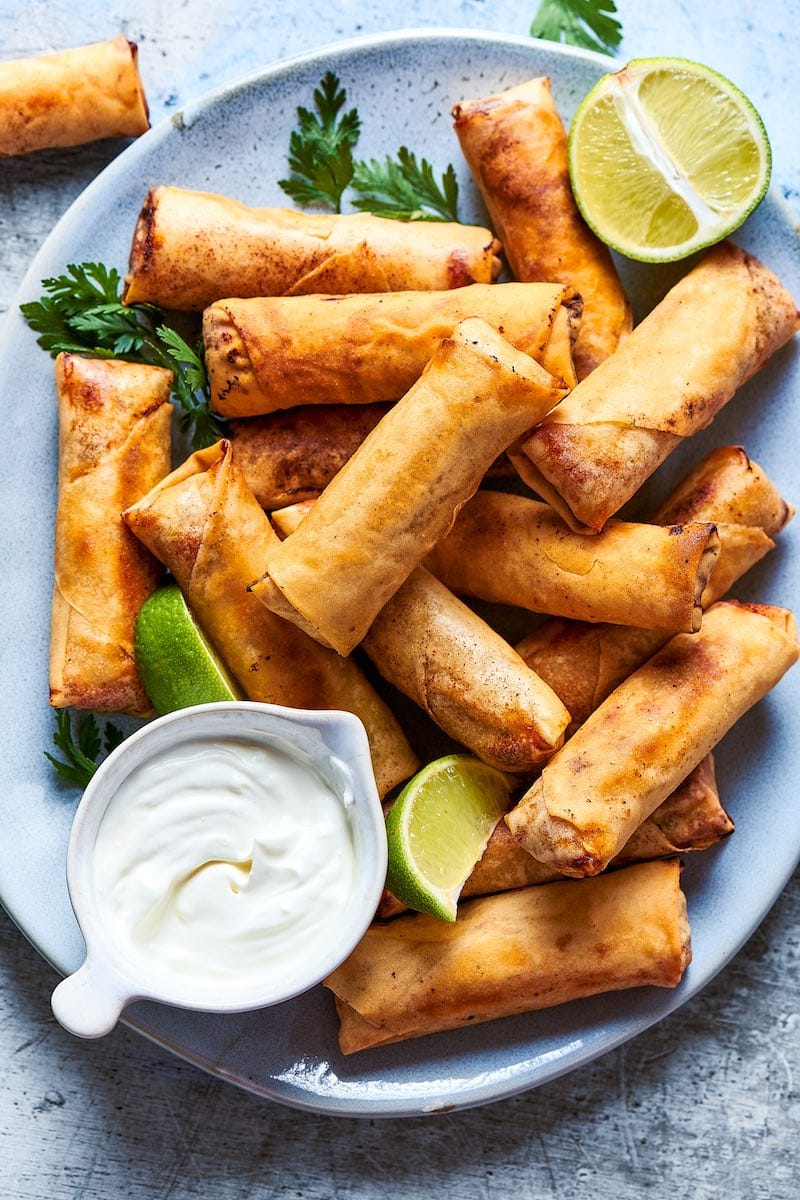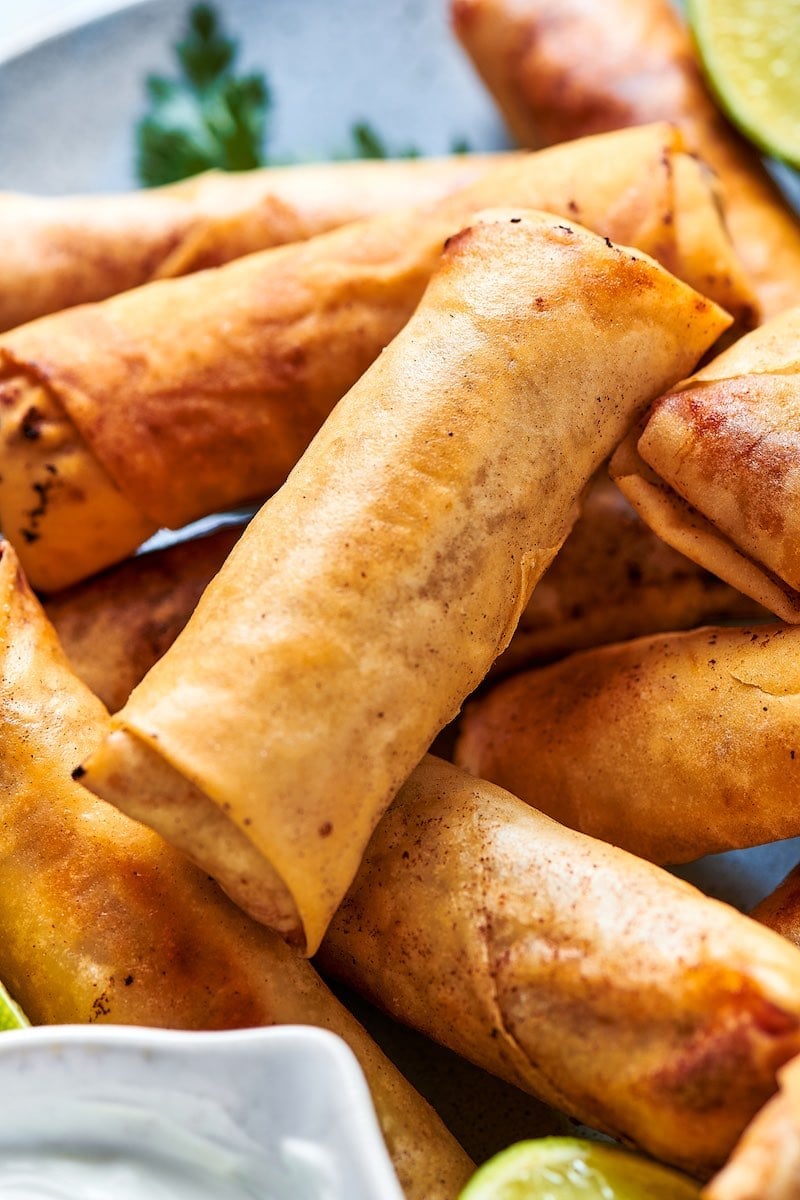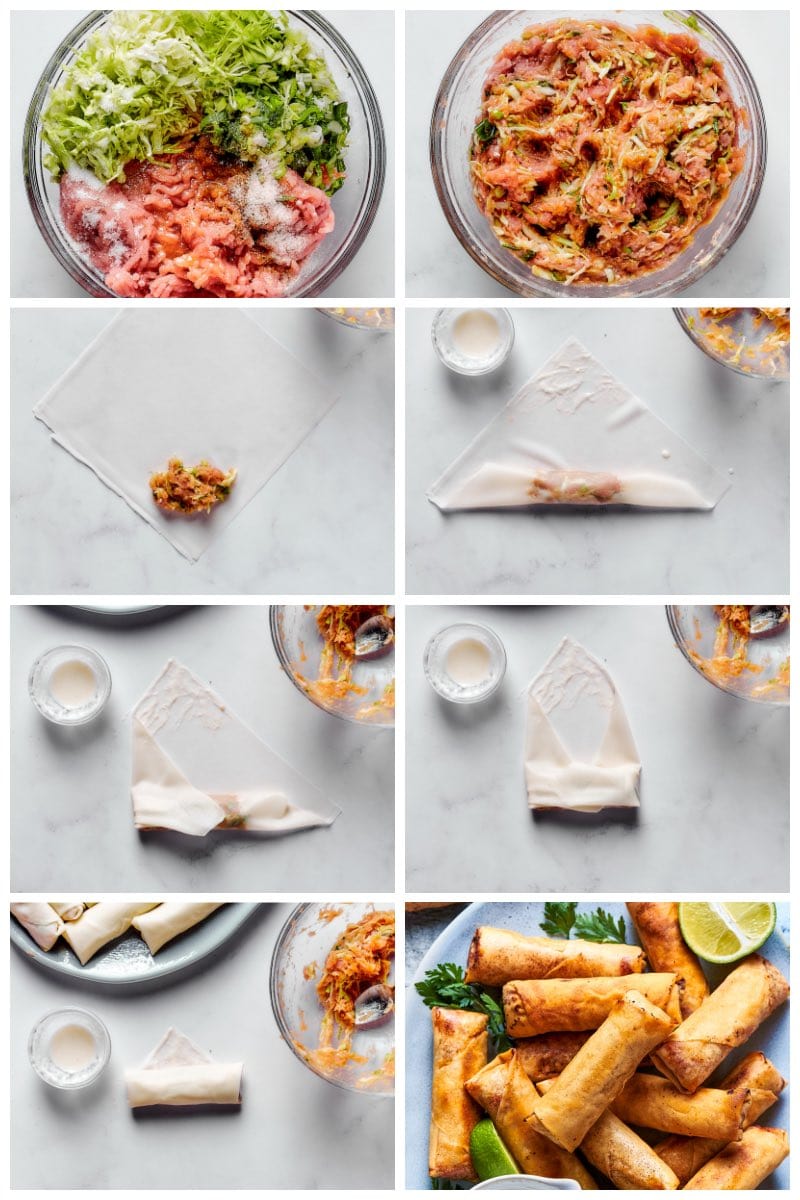Harumaki
This post may contain affiliate links. See my disclosure policy.
My harumaki, AKA Japanese-style spring rolls, are stuffed with juicy meat and tender veggies and fried until golden brown. Each is delicate yet crispy and SO easy to make!

Ready to up your Japanese fakeout game? Make my version of harumaki.
Also known as Japanese spring rolls, they consist of savory-seasoned ground pork and tender veggies wrapped in thin spring roll wrappers and lightly fried until crackling crisp and golden brown. While not the authentic Japanese recipe (I suggest checking out Just One Cookbook’s Harumaki for that!), it’s my simplified version.
Table of Contents
Why I love this recipe
- Perfect texture and flavor. I hate it when I order spring rolls that come out soggy or, worse, taste only of oil. My Japanese spring rolls have the perfect texture, and you really taste the filling.
- Surprisingly easy to make. Restaurants may have tricked you into thinking spring rolls are complicated, but mine couldn’t be easier to make.
- Customizable. Save yourself the trouble and use your favorite veggies, swap the meat, or omit it completely to make vegetable spring rolls.

Ingredients needed
- Pork. I used lean ground pork, but you can use higher-fat cuts of pork, ground chicken, minced shrimp, or even minced tofu.
- Soy sauce. For a savory flavor.
- Black pepper. Just a pinch.
- Sugar. To balance out the salty ingredients.
- Sake. The secret ingredient that adds a subtle layer of flavor.
- Egg. To keep the filling moist and malleable.
- Sesame oil. A must in Asian cooking.
- Vegetables. I used cabbage and green onion.
- Egg roll wrappers. Easily found in Asian grocery stores or the chilled section of your local supermarket.
- Oil. When frying, always choose oils with a high smoke point, like vegetable oil or peanut oil.
How to make harumaki
I’ve included step-by-step photos below to make this recipe easy to follow at home. For the full printable recipe instructions and ingredient quantities, scroll to the recipe card at the bottom of this post.
Step 1- Mix the filling. In a large bowl, combine all ingredients except the wrappers and frying oil.
Step 2- Prepare the wrappers. Read the egg roll wrapper instructions and prepare them accordingly.
Step 3- Stuff. Using lightly wet hands, scoop golf ball sized portions of the pork mixture.
Step 4- Wrap. Place each portion onto a spring roll wrapper, fold it lengthways, and close it on either end. Repeat this process to make 25 egg rolls.
Step 5- Fry. Add oil to a large frying pan. Once hot, fry the spring rolls until they are golden and crispy on both sides.

Arman’s recipe tips
- Don’t overstuff the rolls. Or else they’ll explode in the skillet–just trust me…
- If your wrappers aren’t sticking together, mix a little water and flour until you have a paste, then brush this along the edge of the wrapper to help it seal.
- Transfer the cooked egg rolls to a paper towel-lined plate to drain the excess oil.
- Fry in batches. If you add too many spring rolls to the pot, the oil temperature will drop, and they won’t get as crispy.
- And don’t forget the dipping sauce! Traditional Japanese egg rolls are served with a mixture of soy sauce, rice vinegar, and karashi (Japanese mustard seed), but you can also serve them with potsticker sauce, peanut sauce, tempura sauce, or spicy mayo.
Variations
- Get creative with the veggies. Add finely shredded carrots, peas, bean sprouts, or shiitake mushrooms.
- Add spices. If you can handle the heat, add a dash of paprika, red chili flakes, or chili sauce to the pork mixture.
- Experiment with aromatics. Try adding finely chopped ginger or cilantro.
Storage instructions
To store: Place leftovers in the sealable container and store them in the refrigerator for up to 3 days.
To freeze: Place the cooked and cooled spring rolls in a ziplock bag and store them in the freezer for up to two months.
Reheating: Reheat in a non-stick skillet or preheated oven.
Make-ahead tip
You can prepare the uncooked spring rolls in advance and cook them later.
Once you’ve prepared the rolls, gently place them in a shallow container, adding parchment paper between each layer to prevent sticking. Store them in the freezer for up to two months.
When ready to cook, let them thaw to room temperature.

Frequently asked questions
Egg rolls usually have a thick wrap that is dipped in eggs before frying. In contrast, spring rolls have a thinner, crisper wrapper that isn’t egg-dipped.
More Japanese appetizers
- Japanese potato salad
- Chicken katsu
- Mochi donuts
- Beef negimaki
- Kani salad
- Tuna tartare
- Chicken yakitori

Harumaki (Japanese Spring Rolls)
Ingredients
- 10 ounces ground pork
- 2 tablespoons soy sauce
- 1/2 teaspoon pepper
- 1 teaspoon sugar
- 1 tablespoon sake
- 1 large egg whisked
- 2 teaspoons sesame oil
- 10 ounces cabbage finely chopped
- 4 large green onions thinly sliced
- 25 egg roll wrappers
- 1/4 cup oil to fry
Instructions
- Mix the pork, soy sauce, pepper, sugar, sake, egg, sesame oil, cabbage and green onions in a bowl.
- Read the egg roll wrapper instructions and prepare them accordingly. If they require soaking, do so.
- Using lightly wet hands, scoop out golf ball sized portions of the pork mixture. Place each portion onto an egg roll wrapper, fold it lengthways, and close it up on either end. Repeat this process until you have 25 egg rolls.
- Add oil to a non-stick pan. Once hot, fry the spring rolls until they are golden and crispy on both sides, around 4-5 minutes.
- Place the cooked harumaki on a paper towel to soak up excess oil. Serve immediately.
Notes
Nutrition
Originally published July 2022, updated and republished July 2024














I always was buying spring rolls frozen from Lidl. Now I finally have the recipe to make them homemade!
What can replace the sake in the recipe ?
a touch of vinegar is fine
These are wonderful! I air-fried mine, OMG, they come out nice & crispy without all that oil (just spritz them with EVOO before placing in the basket). THANKS for another great recipe – you & your site are AWESOME! I’ve already turned 2 vegetarians/vegans onto this blog. I’ll make that yummy 3-ingredient coconut ice cream soon!
Aw I love that!!! So glad to hear the air fryer option worked well for you 🙂
Is there a recipe to make diy keto friendly egg roll wraps?
Not that I’ve come across!